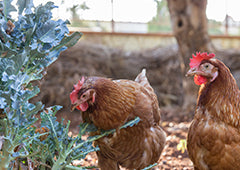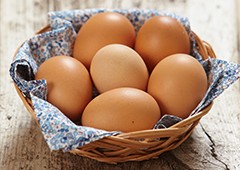We’ve had a few queries from some of our chicken keeping customers who have a rooster in their flock about fertile eggs. How do you tell if an egg is fertilised? Can you still eat them? Well we’re here to unscramble some fertile egg FAQ’s!
How to identify a fertile egg
If you crack it open, a fertile egg can be identified by a small white circle on the yolk called a ‘blastodisc’. This has a ‘bullseye’ like shape - i.e. one small white circle, with another white ring on the outside of it.
This white circle is merely a cluster of cells, and not a baby chick. It is only when a fertilised egg is incubated through a broody hen sitting on them, or by an incubator, that the cells will begin to develop into an embryo. So if you collect your eggs freshly laid, there’s no chance of it being an embryo.
Can I eat my chicken’s fertile eggs?
The short answer is yes! There are no adverse effects from eating a fertilised egg, nor is there any taste difference. You can prepare and serve fertilised eggs just as you would unfertilised ones!
Is there a point when fertilised eggs shouldn’t be eaten?
If you haven’t collected your hens eggs for a few days, or your hen has gone broody and is sitting on them, they may have been incubated and the embryo may be developing - not something that is particularly palatable to most of us!
You can candle the egg to see if it has developed by going into a dark room, and shining a bright light onto the larger side of the egg. You should be able to see a dark embryo and some spider veins if the embryo is growing.
So if you’ve got a rooster in your flock and don’t know if your eggs or fertilised, don’t be hesitant. If you’ve collected them fresh, they are still perfect to scramble, fry, poach and eat!
If you are hoping for some fertile eggs, bringing new life into the world is a joyful and extraordinary experience for the whole family. Nothing compares to seeing fluffy little hatchlings peck out of their shells. Getting to this perfect moment does come with a fair few challenges and risks which can be stressful and overwhelming, especially without the right information.
This is why I recommend our friends at Chickenpedia to all of my readers. They have created the brilliant Hatch A Plan course to help you successfully incubate and hatch happy and healthy chicks. Their course offers the best advice to ensure you build your knowledge to avoid tragic disasters, as these little ones can be so sensitive to temperature! You can learn about the conditions and equipment needed to confidently bring new life into the world.
As chicken keepers, we want to do an eggcellent job when caring for our feathered friends. Many chicken keepers struggle to handle chicken health or behaviour issues, especially in the first few years of having a flock. Chickenpedia have comprehensive online courses on everything you didn’t know you need to know and then some more! From raising baby chicks to feeding and behavior, you’ll find beginner-friendly courses that’ll give you the knowledge and confidence to successfully look after your chickens for years to come.
These courses are exclusive to members only, so flock to Chickenpedia today!


















